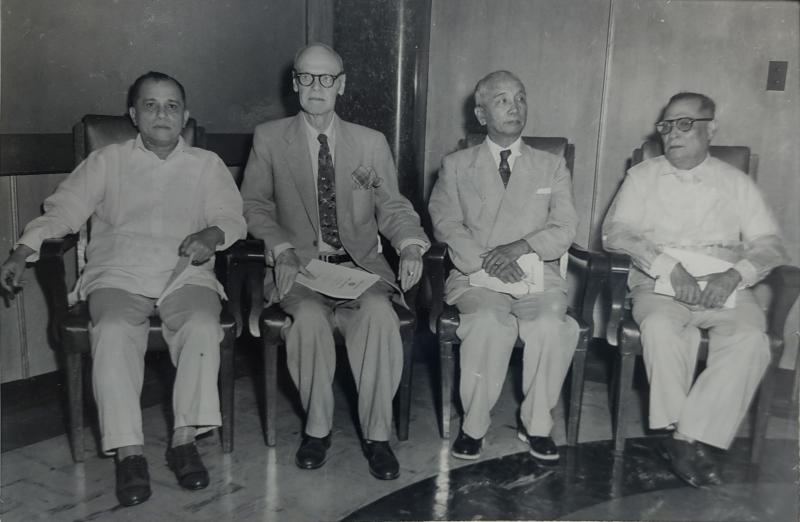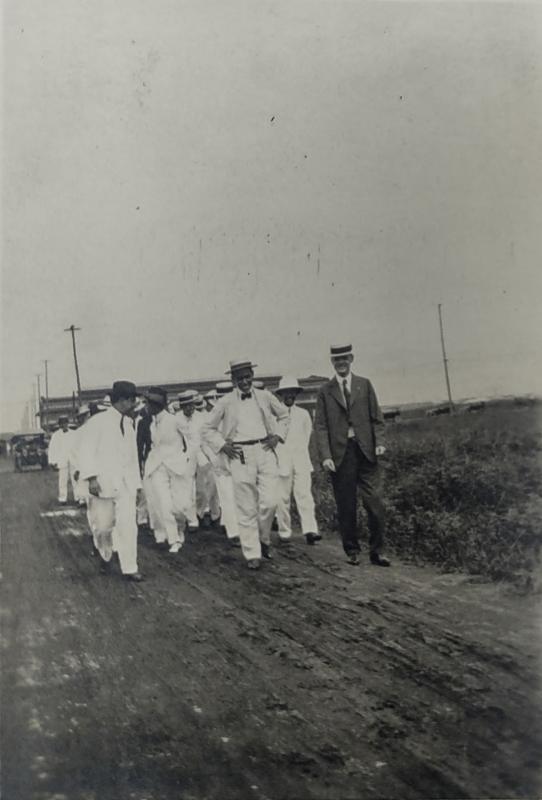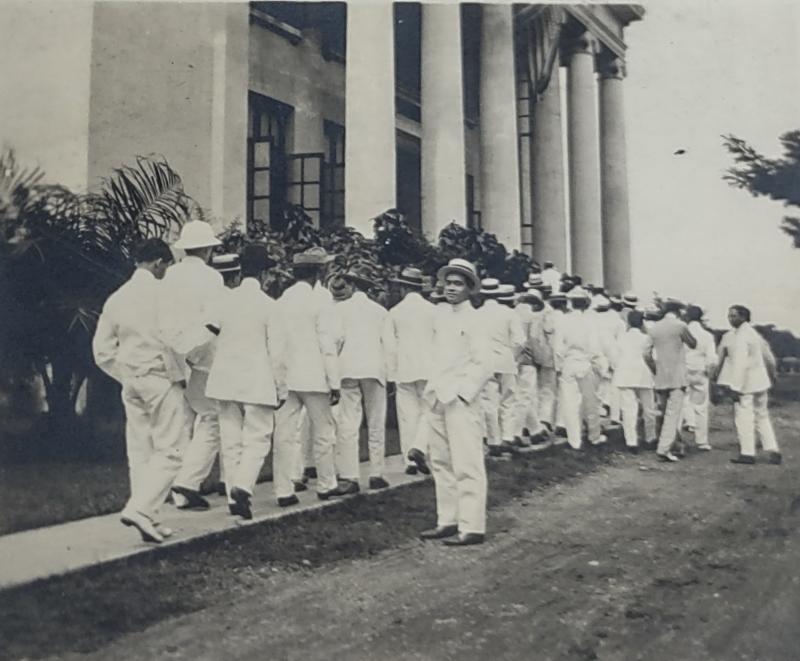Law and the Legacies of Colonial Education
Americanizing Education in the Philippines
Jorge Bocobo was the second Dean of the University of the Philippines College of Law and its first Filipino Dean. He was also the first Filipino to be brought into the faculty there, initially serving as a professor of civil law before becoming Dean. He later became president of the University of the Philippines, or UP. Bocobo was the first of many Filipinos to teach at the College of Law, and one of many accomplished Filipinos who either worked or studied there.[1] Bocobo had a longstanding connection to the U.S., having attended the Indiana University School of Law, graduating in 1907.[2] Although the Law School is a well-regarded place of study in the present, it began as an American institution with goals that aligned with American colonial interests. In a scrapbook of newspapers, the College of Law is described as having the goal to be one of the best law schools in the world. It says that the law school focused on the practical learning of law over academics, was the first to have a student council, an oratorical contest and annual debate, and to have social gatherings and athletics. Supported by the influential Filipinos attending there, the law school was envisioned as an institution that would create new leaders of the Philippines and a system of law for the Philippines based on the American model.[3]
Introducing Malcolm
The University of the Philippines’ School of Law was formed around the opinions of one man, George Arthur Malcolm. He was an alum of the University of Michigan Law School and had one of the longest colonial careers of any American in the history of the Philippines. Over the course of thirty years, he held various positions in the U.S. colonial government, beginning as a temporary clerk in the Bureau of Health. He completed his most well-known act in 1911, the founding of the UP College of Law, and is credited as its founder to this day. Malcom went on to serve as a justice on the Supreme Court of the Philippines and later held a position as legal advisor to the U.S. High Commissioner Frank Murphy and later Paul McNutt.[4] Such a long career had far-reaching effects for the Philippines to the present day.
The “Philippine Question” and Independence
Patrick M. Kirkwood, writing about Malcolm and “Michigan Men” in the Philippines, describes Malcolm as someone who held “inclusive personal views regarding the mental, and therefore political, faculties of Filipinos.”[5] While it may be true that Malcolm was by all appearances more open-minded than many of his peers, he also did little to push back against the role of University of Michigan alumni in colonialism in the Philippines, and even applauded the “work” that was done. Malcolm stated UM need not be ashamed of the “accomplishments” of its alumni.[6] What is clear about Malcolm is that for all the work he did in the Philippines, he always saw himself first as an American citizen doing the work of the American government in the Philippines.
Despite his more inclusive ideals, Malcolm, and thus the School of Law believed in independence for the Philippines and education for Filipino students because it benefited the United States. At a centennial luncheon sponsored by the Jackson Rotary Club, Lions Club, and Jackson County Bar Association in Michigan, Malcolm stated that the Philippines and China posed a threat to the U.S. Essentially, he thought that the Philippines should be completely independent if the U.S. was going to prohibit the people there from participating in U.S. trade, politics, etc.[7] In a different speech, Malcolm stated that he was of the opinion that the U.S. should stay in full control of the Philippines or leave entirely, preferably leaving to avoid confrontation with Japan who had just taken Manchuria. In another talk to the State Society Federation, Malcolm said that while he respects “his own country” the crime rate in the Philippines is lower overall, and that “The Filipinos have made swift, steady progress since the days of Aguinaldo, who himself is now a useful citizen, and they stand today a fine law-abiding people.”[8]
Finally, in a confidential memorandum for the president of the United States, Malcolm makes clear his position on what he called the “Philippine Problem”.[9] Malcolm refers in the letter to the 1916 “Jones Law” and its promise to eventually give independence to the Philippines. He begins with the position that this promise should be upheld. He states that “Geographical distance from the United States and differences of race, language and habits of thought, put statehood for the Philippines out of the realm of reasonable possibility.”[10] Malcolm’s stance was essentially then that Americans and Filipinos could not mix together in permanent union, despite all the years he lived there. Malcolm ends with his proposed solution to independence for the Philippines: That the U.S. should retain complete administrative control until such a time as the people of the Philippines are made “ready” for self-government.[11]
Despite his belief in the abilities of all people, Malcolm still identified with Americans more than Filipinos and saw himself as an American agent. Even if his ideas were more progressive than previous colonialists, he still continued a legacy of Americanization of the education and law systems of the Philippines that looked down on Filipinos as people in need of a “real” system of education and law.
English as the Primary Language of Law
From the beginning, the stated purpose of the University of the Philippines College of law was to be a place that would serve to instruct Filipino students in the profession of law, with a focus on the use of English in the classroom. While it created opportunities for many Filipinos who found lucrative careers in law and held important positions as presidents and Supreme Court justices, it also forced the Philippines into an American model of education and law, and hailed English as the primary language by which law and business should be conducted. Under the surface, other ways of living were being suppressed.
As the linguist and scholar T. Ruanni F. Tupas puts it, American colonialists such as Malcolm made the assumption that the many languages and dialects of the Philippines were a “problem” that could only be solved by making English a unifying language. An American education system such as the one at the College of Law in many ways assumes that it is somehow “uplifting” Filipinos by giving them an education they otherwise would not have had access to, and that English and education would bring them into the modern world that the United States already inhabited.[12]
In a letter to Congressman Helvering on November 20th, 1913, Malcolm stated that while he believes the United States may have tried to force American culture onto the Philippines in some cases, that overall the effect of American education on the youth was positive, including in regards to the English language requirement. He supported English as the primary language of the Philippines because it would essentially unite the country and was considered to be the language of international trade and diplomacy.[13] This view, of course, mostly only praises the actions of the United States towards the Philippines and ignores the erasure of culture and language it causes. As Tupas argues, using English as a unifying language was built on the assumption that the Philippines must have a language to unite it as a democracy.[14]
Filipinization of the College of Law
The replacement of American faculty and Malcolm himself with Filipino faculty such as Jorge Bocobo was a stated goal of Malcolm and the College of Law from the beginning. The University of the Philippines, while an institution created by an American for what was thought of as the “enlightenment” of Filipino students, was also designed to lead towards a government, court system, educational system, and in general, a Philippines controlled by Filipinos. In a law journal entry found in the first volume of addresses and articles by Malcolm, Malcolm writes that the College of Law began as law courses offered to Americans and Filipinos by the YMCA under his supervision, with the stated purpose of offering law classes in the English language, hoping to make it the official language of law in the Philippines.[15]
In his inaugural address as Dean, Malcolm stated that he wished to see the law school be a place where Filipino students and faculty are known as some of the best in the world and all students would be admitted and graduate based solely on academic ability.[16] On the surface this was a noble goal of the College of Law, but it also brushed away the overtone that the College was meant to “civilize and educate Filipinos so that they might be ready to govern themselves”.[17] This was a system built on the idea that it was the Americans who must first develop the College of Law and then hand it over to Filipinos such as Jorge Bocobo. It was a mentality that America’s system was something to strive towards, ignoring the often-bloody history of how that system came to be under a colonial government.
Reading Between the Lines
When going through the primary sources collected about Malcolm, it can be very easy to be pulled into a certain narrative that these primary sources create for you. Having been put together by Americans, these sources carry with them a colonial past that selects certain parts of history and silences others. There is no doubt that Malcolm was, and to some extent today still is, highly regarded in the Philippines. For example, former students gave Malcolm a silver plate on his birthday in 1931 engraved with their names “in testimony of friendship and admiration”. In another instance, Malcolm’s class of 1916 jokingly honored him with a cane engraved with his name and the year of his “conviction” on grounds of not marrying to the detriment of public welfare, making the law school so lauded that it hurt the other schools, and helping the students so much that others were envious.[18]
In a speech to honor the memory of Malcolm, an unidentified speaker talked with great passion about how Malcolm was a friend to Filipinos, not having the prejudice of most American colonialists and being willing to help in the independence movement. His loss is described as “the loss of a great teacher and a true friend”.[19] Malcolm’s history is not black and white, but rather a mix of the two. It would be easy to identify Malcolm simply as a heroic figure who did important work in the Philippines, and while it should not be denied that his work did clearly have a positive impact for many people, his work also furthered an American colonial agenda that sought to Americanize education and law in the Philippines. American colonialism in the Philippines affected the culture, language, and systems under which people lived, often in very negative ways, and this history is often silenced or overlooked. This damage is not something that is recognized in the history of Malcolm and the College of Law when looking at the primary sources on a surface level, making it all the more important.
Citations
[1] George A. Malcolm, "The College of Law, University of the Philippines, Its History and Proper Function," Philippine Law Journal 19, no. 3 (September 1939): 111-116
[2] "Jorge Cleofas Bocobo" Maurer Notable Alumni, (1886): 186. https://www.repository.law.indiana.edu/notablealumni/186
[3] Scrapbook by C. Malcolm, 1909-1917, vol. no. 3, Box 2, George A. Malcolm Papers 1896-1965, Bentley Historical Library, University of Michigan.
[4] Biographical Account of George A. Malcolm, Box 1, Biographical Materials circa 1961, Box 1, George A. Malcolm Papers 1896-1965, Bentley Historical Library, University of Michigan.
[5] Kirkwood, Patrick M. “‘Michigan Men’ in the Philippines and the Limits of Self-Determination in the Progressive Era.” Michigan Historical Review 40, no. 2 (2014): 63–86, https://web-p-ebscohost-com.proxy.lib.umich.edu/ehost/detail/detail?vid=9&sid=28898fc2-1271-4305-b97c-4a0e0b7c4618%40redis&bdata=JnNpdGU9ZWhvc3QtbGl2ZSZzY29wZT1zaXRl#db=31h&AN=99409685
[6] Ibid.
[7] Scrapbook by C. Malcolm, 1926-35, vol. no. 4, Box 3, George A. Malcolm Papers 1896-1965, Bentley Historical Library, University of Michigan.
[8] Ibid.
[9] “Occasional Addresses and Articles Volume 3”, 1923-29, Box 10, George Arthur Malcolm Papers, Bentley Historical Library, University of Michigan.
[10] Ibid.
[11] Ibid.
[12] Tupas, T. Ruanni F. “Bourdieu, Historical Forgetting, and the Problem of English in the Philippines.” Philippine Studies 56, no. 1 (2008): 47–67. http://www.jstor.org/stable/42633941.
[13] “Occasional Addresses and Articles Volume 1”, 1901-1914, Box 10, George Arthur Malcolm Papers, Bentley Historical Library, University of Michigan.
[14] Tupas, T. Ruanni F. “Bourdieu, Historical Forgetting, and the Problem of English in the Philippines.” Philippine Studies 56, no. 1 (2008): 47–67. http://www.jstor.org/stable/42633941.
[15] “Occasional Addresses and Articles Volume 1”, 1901-1914, Box 10, George Arthur Malcolm Papers, Bentley Historical Library, University of Michigan.
[16] Ibid.
[17] Ibid.
[18] Scrapbook by C. Malcolm, 1909-1917, vol. no. 3, Box 2, George A. Malcolm Papers 1896-1965, Bentley Historical Library, University of Michigan.
[19] Memorial service for George A. Malcolm July 14, 1961 ([851764-SR-2]) (1 audiotape (Audiotapes; 7 inch)), Recorded by Discipline of Speech and Drama College of Arts and Sciences Univeristy of the Philippines DZUP, Box 11, George A. Malcolm Papers 1896-1965, Bentley Historical Library, University of Michigan.



